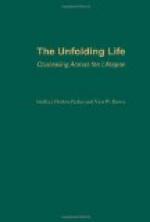The responsibility that grows out of this thought of nurture is almost crushing, yet its opportunity is sublime. To make a boy strong for his life work, because the right word was spoken at the critical moment, the encouragement given just when his purpose was faltering, to help a girl reach glorious young womanhood because the inspiration came as she stood at the parting of the ways—surely this, in a very real sense, is working with God. The story of almost every life of marked power, reveals a human touch at the cross roads. Is this one meaning in the Master’s words, “Inasmuch as ye did it,” or “Inasmuch as ye did it not?” “I would have been on the foreign mission field seven years ago,” said a splendid young man, “had not my Sunday School teacher laughed at me when I told him my new born desire. I expect to go now, but what of those seven years?”
If the home and the church should begin at once to obey God’s command to nurture the children “In the chastening and admonition of the Lord,” with all that means, the next generation would see the kingdoms of this world given to Christ and the advent of the King.
III. The Third Principle defines the work of nurture.
“Nurture must care for both nourishment and activity.”
1. The Watch Care over Nourishment.
Nourishment is the general term for all that upon which the life feeds. It is given both consciously and unconsciously and is absorbed in like manner, but in its effect upon the life, the unconscious nourishment has greater power.
(1) Unconscious Nourishment.
(a) The first factor in unconscious nourishment is personality.
Just as truly as the physical life is nourished by life, so is the mental and the spiritual. Standards of living, ideas, a sense of values, opinions, do not come from text-books but fathers and mothers. The lesson from the printed page may fail to gain entrance, but the lesson from the teacher’s life, never. This explains the success of many a humble mother and the failure of many an intellectual teacher. It is at the very heart of all work for another.
Its first message is a personal one. It tells the worker that his life is more compelling than his voice; that the Word must again become flesh to give it authority. It tells him further that if he is to be the bread of life to growing souls, his own pasturage must not be things, but in reality, the living Christ.
The other message applies to his work. While every life that touches his will always carry away something from the contact, the most helpful human life can never suffice for another’s nourishment. Each soul needs the complete Christ for itself. The amazing thing among parents and teachers is their unconcern over His absence from the lives of the children. Years pass, and precept, lesson and admonition are given, while Christ, the Life, is not definitely and personally offered. “According to their pasture so were they filled.” Is not this the explanation of so many meagre lives?




